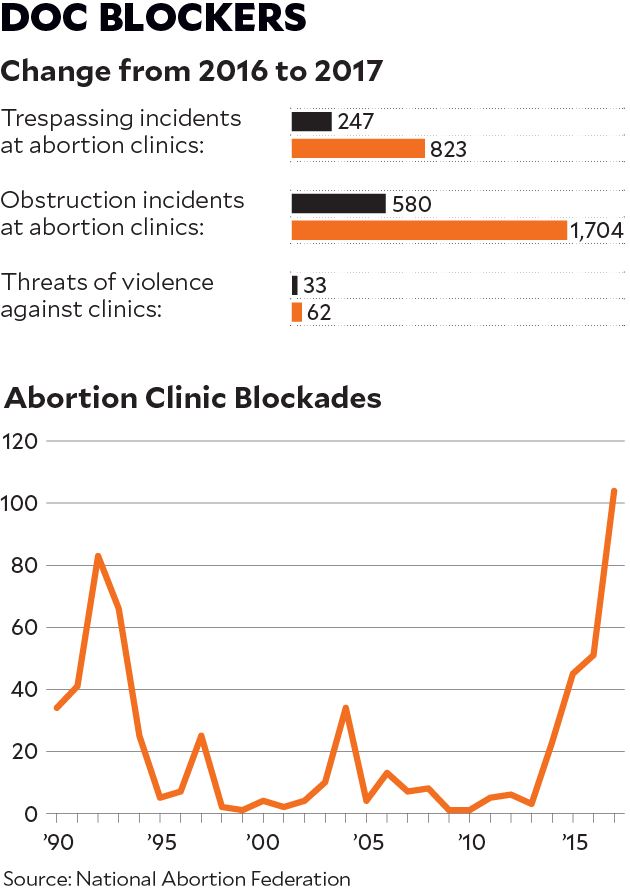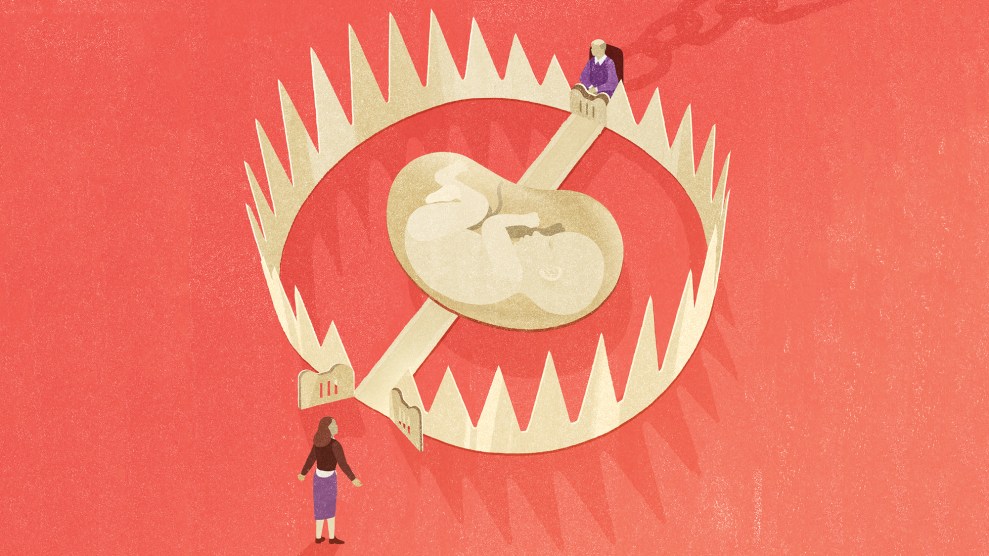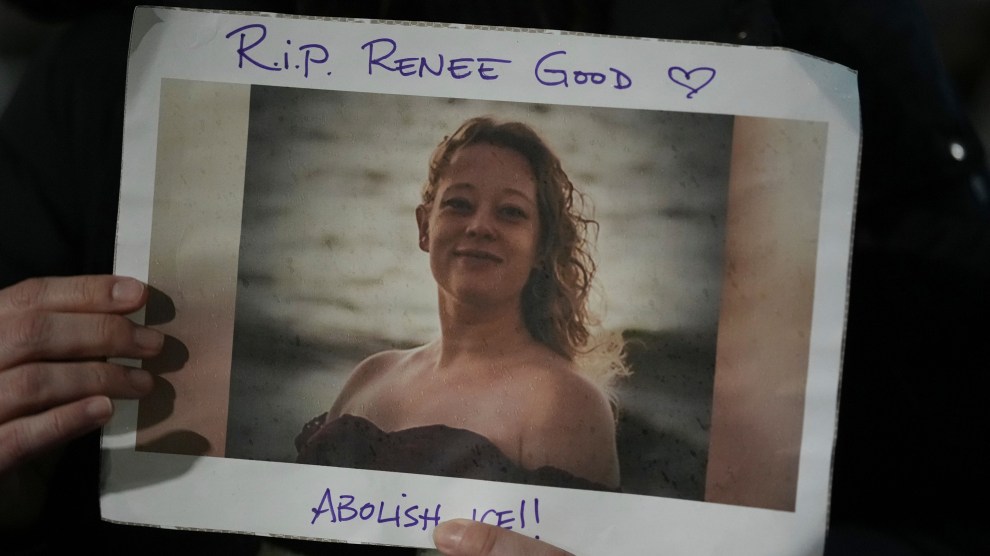
Before marching into the women’s health clinic in West Bloomfield Township, Michigan, on a freezing day last December, Monica Migliorino Miller and her compatriots paused to ask God to soften the hearts of the women inside to be open to their message. When Miller came through the entrance, the abortion clinic’s staff asked her to leave. Miller pushed past the receptionist, entered the waiting room, and began handing the clinic’s clients red roses with tags promising to help each woman “rediscover her own and her baby’s unique dignity.”
Some of the clients were shuffled into a back room; one left. When the police arrived, Miller and the small group of Christian pro-life activists she was leading went limp on the floor. Miller was carried outside, where, along with four others, she was arrested. She was charged with trespass and obstructing a police officer.
This was a tried-and-true routine for Miller, a lifelong anti-abortion radical who sees her rap sheet as a badge of honor. Miller, now 65, came of age at the height of the anti-abortion movement’s backlash against Roe v. Wade. She joined a radical group that used tactics like chaining protesters to clinic doors and pouring glue into the locks. Miller became a leader of the “rescue” movement of the ’80s and ’90s, which staged elaborate protests in which pro-life activists “saved” countless babies by means of more than 500 clinic blockades and 31,000 arrests.
Their offensive culminated in 1991, during the so-called Summer of Mercy, organized by Operation Rescue and its leader Randall Terry. For six weeks, thousands of activists descended on Wichita, Kansas, where one of only a few doctors who performed abortions in the third trimester of pregnancy, George Tiller, worked. The protesters flung themselves under vehicles to prevent them from entering clinic parking lots; federal marshals were deployed to keep the clinics open. Two years later, an abortion doctor was murdered during a clinic protest in Pensacola, Florida. (An anti-abortion activist shot and killed Tiller in 2009.) In 1994, Congress responded to the mayhem with the Freedom of Access to Clinic Entrances (FACE) Act, which made interfering with clinics a crime. With its militant wing indelibly tied to murder, the rescue movement was all but dead by 1995.

The strategy of targeting abortion clinics has also made a comeback since President Donald Trump took office. In 2017, the National Abortion Federation documented a sharp increase in trespassing and obstruction at its member clinics, as well as nearly double the number of threats of violence against doctors and staff compared with 2016. In May 2017, a small group of activists was arrested after blockading the entrance of Kentucky’s last remaining abortion clinic. Ten of them were indicted for violating the FACE Act—the first such charge during Trump’s presidency. These cases, Ziegler says, “test” the limits of the act. Abortion opponents pivoted, recruiting conservative lawmakers to take up the cause by pushing the limits of Roe. Over the past two decades, states under Republican control have enacted hundreds of restrictive and sometimes invasive laws (such as those forcing women seeking abortions to undergo ultrasounds) designed to make it as difficult and unpleasant as possible to obtain abortions. Mike Pence, who spearheaded some of the nation’s strictest anti-abortion laws while he was governor of Indiana, now stands a heartbeat away from the presidency. And with Justice Neil Gorsuch sitting on the Supreme Court and conservative Judge Brett Kavanaugh nominated to join him, anti-abortion advocates are perhaps as close as they have ever been to rolling back Roe v. Wade. This time, they are “betting that the courts will be different enough that the outcome of their lawsuits might be different,” says Mary Ziegler, a Florida State University law professor and author of the book After Roe.
In the spring of 2017, Miller saw an email from John Ryan, one of the original abortion “rescuers,” who reportedly has been arrested more than 300 times and was recently acquitted of terrorism charges for allegedly making a bomb threat against a Planned Parenthood clinic. He asked whether they should restart the rescue movement. It was a question Miller had often considered while growing frustrated that she’d been relegated to demonstrating outside clinics. As she lay in bed one night thinking about how she could reboot her work of years past, she considered the rose—a longtime pro-life symbol. It had been recently adopted by Mary Wagner, a Canadian Christian radical whose peaceful occupation of abortion clinics around Toronto had been covered by pro-life websites. Miller proposed the idea to Ryan and other anti-abortion leaders: Why not try something similar here?
So began the Red Rose Rescue. Last September, Miller and other pro-lifers walked into abortion clinics in Michigan, Virginia, and New Mexico, where, roses in hand, they tried to persuade women to cancel their appointments. On the day Miller and her comrades were arrested in Michigan, so were six fellow activists in Washington, DC, and Virginia. Among them was Lauren Handy, a 24-year-old “Catholic anarchist” who told Rewire, “I don’t recognize the civil authority of government, only God’s authority.”
Miller, a theology professor at Madonna University outside Detroit, has a serious demeanor and speaks in a deep, authoritative voice. She is adamant that the revival of clinic-level tactics is only about saving babies and helping women. “The Red Rose Rescue is not a political challenge to the system,” nor does it have anything to do with Trump, she tells me, though she adds, “We feel there is no reason why we can’t engage more directly. Who is drawing the boundary lines here? They are.”
Miller is no stranger to political stunts. In the late ’80s, along with a small group of activists, including the author of a notorious abortion rescuer’s manual, she took thousands of fetal remains from the medical waste drums of a Chicago clinic over a 10-month period. They were photographed and shipped to pro-life groups around the country to be used as props during “mass burial services.” For years, according to the New York Times, many of the photos have been displayed on protest posters, in pamphlets, or blown up on the side of trucks.
For her December clinic trespass, Miller was sentenced to a year of probation with several conditions she calls “unprecedented in the history of legalized abortion.” She is prohibited from going within 500 feet of a clinic or contacting any of her co-defendants. But when I meet Miller at a place she asked me not to disclose—by coincidence, on the ninth anniversary of Tiller’s murder—Will Goodman, who was arrested with her in West Bloomfield, is in tow. Miller’s not concerned; she tells me she intends to publicly violate her probation by protesting at the same clinic the following day. Goodman, a soft-spoken Wisconsinite, compares their work to that of Mother Teresa, who wasn’t afraid to enter the poorhouses of Calcutta. Miller shows off a framed letter from Mother Teresa herself. “The greatest destroyer of peace today is abortion,” Miller reads aloud. “Let us pray and make many sacrifices to protect the precious gift of life given by God himself.”
The next morning, I find the pair outside the West Bloomfield clinic. They are joined by a handful of women, including Lynn Mills (Twitter handle: @notababykiller), the director of a Michigan pro-life group. Mills stands on the sidewalk wearing a GoPro and shouting “Mom!” at women walking toward the clinic door. When a doctor comes out to grab something from his car, Mills picks up a megaphone and yells at him to “turn yourself in.” A woman from the conservative Catholic website ChurchMilitant.com collects smartphone footage of his SUV and license plate. “Is that an invasion of privacy?” she wonders aloud. Mills reassures her, “No, I know where he lives!”
In the parking lot, Miller approaches a young woman who is getting out of her car. When she rejoins the others, she is ebullient: “I just talked a woman out of an abortion!”
After about an hour, several police cars arrive—someone complained about protesters handing out pamphlets and bothering customers of the Starbucks and Chipotle next door. “Monica is getting her wish,” mutters the woman from ChurchMilitant. One cop asks everyone present for ID. Miller and Goodman are then promptly arrested for violating their probation and are driven off to jail. Miller will end up posting a $2,500 bond, but Goodman will choose to stay locked up until their June 14 court hearing, where they will each be sentenced to 45 days in jail. About a week after their release in July, Goodman and Miller will participate in a Red Rose Rescue in Washington, DC. Goodman, two priests, and a woman going by the name Baby Jane Doe will be arrested.
After the police leave, the protesters start packing up. “President Trump, you’re in a pardon kind of mood! Pardon the people in Oakland County, Michigan, please!” Mills shouts at the ChurchMilitant reporter, who is still filming. “You heard it here first!”
This article has been updated.
















